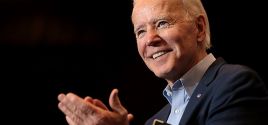Police strike back at television reporter: A Broward police union put personal information on the Web about a reporter for a South Florida television station after he produced a piece called `Police Station Intimidation.'Miami HeraldApr. 04, 2006 |
Popular 
Biden Commutes Sentences of 37 of 40 Federal Death Row Inmates - Excludes Robert Bowers, Dylann Roof

'This is Cruelty, This is Not War': Pope Francis Condemns Gaza Genocide in Christmas Message

U.S. 'Shoots Down Own Jet' Over Red Sea in 'Friendly Fire Incident'

Ohio Senate Passes Bill Aimed at Outlawing Criticism of Israel, Criminalizing Gospel

Putin Accuses 'Ethnic Jews' of Tearing Russian Orthodox Church Apart
 The personal information of an investigative reporter was posted prominently on a South Florida police union's website after a local television station aired a report about how police in Broward and Miami-Dade counties deal with the public. The address, date of birth and driver's license number of WFOR CBS-4 reporter Mike Kirsch was posted as a BOLO -- or ''be on the lookout'' -- on the website of the Broward County Police Benevolent Association. BOLOs typically are issued by police departments when officers are looking for criminals or missing persons. The BOLO reads: ``Channel 4 News is doing a series on the complaint process at police departments in Dade and Broward. They are setting up officers and instigating confrontations, then filing complaints with the various agencies.'' Kirsch first learned about the BOLO from a colleague who saw the flier in a stack of BOLOs at a local police station. New Times reporter Jeff Stratton wrote about the BOLO last week. Kirsch's personal information was removed from the website after a letter from the television station's lawyer. Kirsch's photo is now on the site. Alan Rosenthal, an attorney for CBS-4, a Miami Herald news partner, demanded that the union remove the BOLO, calling it false and a violation of Florida and federal law that prohibits the disclosure of ``personal identifying information contained in motor vehicle records.'' `GOING TO WAR' The reporter said the posting had concerned him and his family. ''I told my wife about it,'' Kirsch said. 'She's from Bosnia. She said, `It sounds like the cops are going to war with you, and you need to be careful.' '' Kirsch said the BOLO ''reminded me this is an intimidation effect,'' he said. ``It might have a chilling effect on any news media establishment from doing their jobs and questioning the system and government. It's just disappointing.'' Lucy Dalglish, executive director of The Reporters Committee for Freedom of the Press in Arlington, Va., said the BOLO ``absolutely is an attempt to intimidate. And it's abusive and downright stupid.'' In its hidden-camera investigation, conducted with a national watchdog group called The Police Complaint Center, one person visited 38 agencies in Broward and Miami-Dade to ask about getting a form to file a complaint against an officer. Only three of the police departments had such forms: Florida City, Homestead and Miami, according to CBS-4. The forms are not required by law, though they are recommended by the International Association of Chiefs of Police. Kirsch noted that at many departments, police were courteous and professional, but in others they weren't. CHANGES AT BSO After the piece, at least one agency pledged to reexamine the process for filing complaints. The Broward Sheriff's Office has made a ''Public Compliment/Complaint Form'' available in the lobby of BSO stations. BSO allows a person to file an anonymous complaint and provides many ways a person's form can be returned, including sending it to BSO internal affairs. In another part of the investigation to check on racial profiling claims, a white man and a black man were given the same red Mustang to drive in the same areas of Broward. According to WFOR's findings, the white man was never pulled over, and the black man was ''almost immediately pulled over'' by a Broward Sheriff's Office deputy on Oakland Park Boulevard. WEBSITE WARNING Shortly after the investigation first aired in February, Broward PBA President Dick Brickman posted the BOLO on the union's website. The BOLO also includes information about Gregory Slate of Baltimore, who works for The Police Complaint Center, including his cellphone number. ''I put the information out so our members if they come across any of these people, they should be aware these people they're talking to probably have you on camera,'' Brickman said. ``They're trying to set you up to aggravate you so you'll make a mistake.'' Brickman said the report should have looked into whether complaints about officers are investigated, not whether there is a form. Of the racial profiling test, the BOLO states: ``Here's how it works: A white male in a red Mustang convertible will speed down the road. Later, the same car, this time with a black male driving, will appear in the same area driving slowly. If the car is pulled over by the police, the occupant will become hostile and accuse the officer of profiling, trying to pick a fight. If the officer responds negatively, a complaint is filed with his/her department.'' The BOLO warns that the CBS-4 team ''is back out on the street'' for a follow-up story planned in May. But Rosenthal, the CBS-4 attorney, wrote that the union ``is not distributing the BOLO to carry out any legitimate law enforcement function, but rather for the sole purpose of harassing and intimidating Mr. Kirsch, Mr. Slate and CBS 4 in an effort to prevent them from investigating and reporting on a matter of public concern.'' Slate filed an internal affairs complaint with the Hollywood Police Department, alleging one of the officers used the National Crime Information Center to provide Brickman with his driver's license number. Diop Kamau, executive director of The Police Complaint Center, who also is a retired Los Angeles police sergeant, said it's ``inappropriate for police to be crossing back and forth over the line that is the private behavior of police unions and the public behavior of officers.'' HOLLYWOOD PROBE Hollywood police Lt. Richard Nardello, of the police Internal Affairs Unit, wrote, ``An investigative search through the Florida Department of Law Enforcement unequivocally concluded no one associated with the Hollywood Police Department had queried your name or driver's license number.'' Nardello found the complaint to be unfounded. John Rivera, the Miami-Dade Police Benevolent Association president, declined to comment about the Broward union's BOLO. Of the CBS-4 series, Rivera said: ``It was such a joke that we ignored it.'' Miami Herald staff writers Wanda J. DeMarzo and David Ovalle contributed to this report. |



